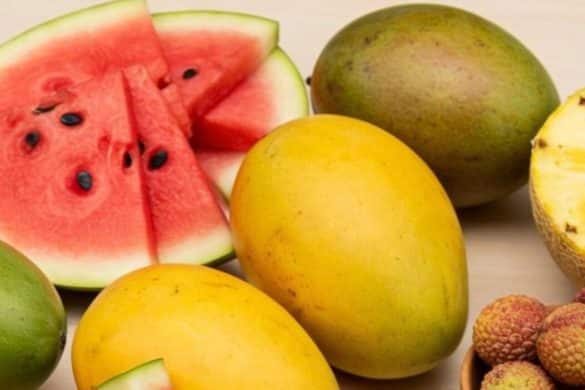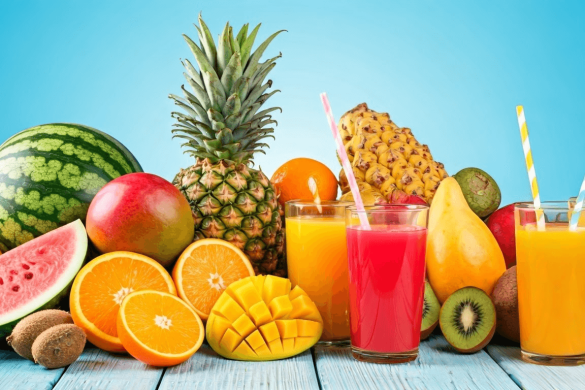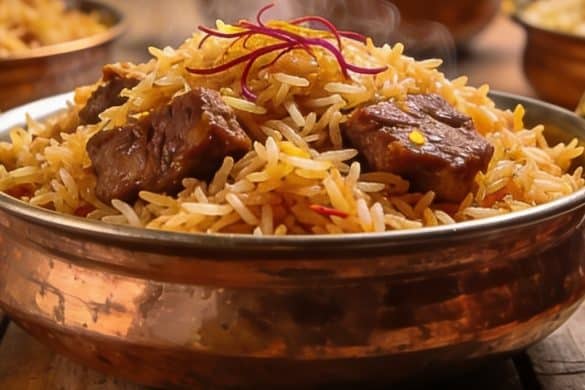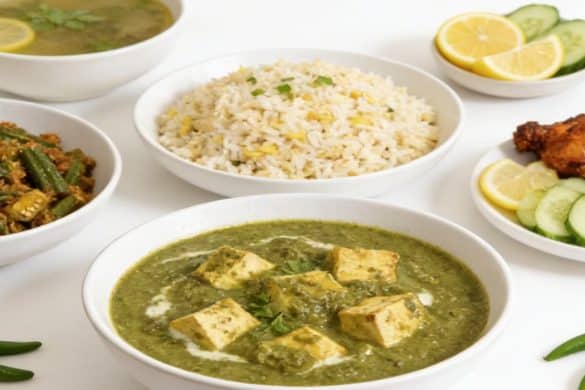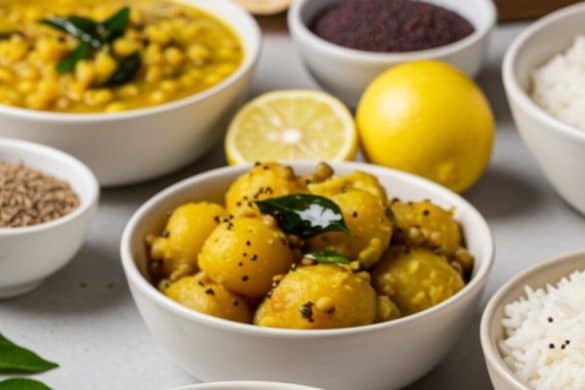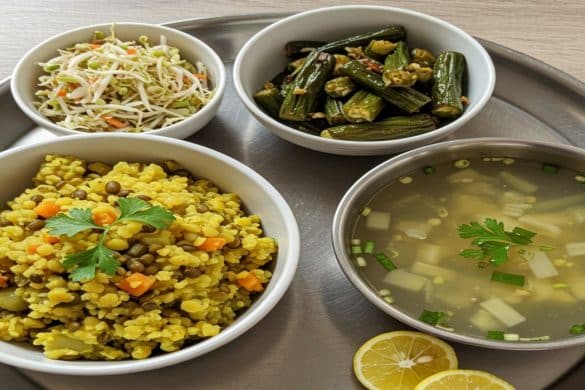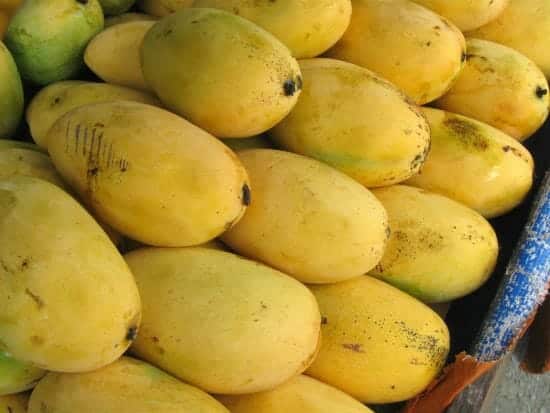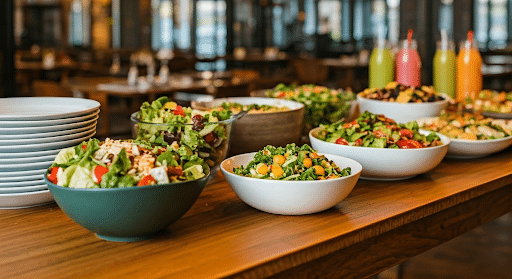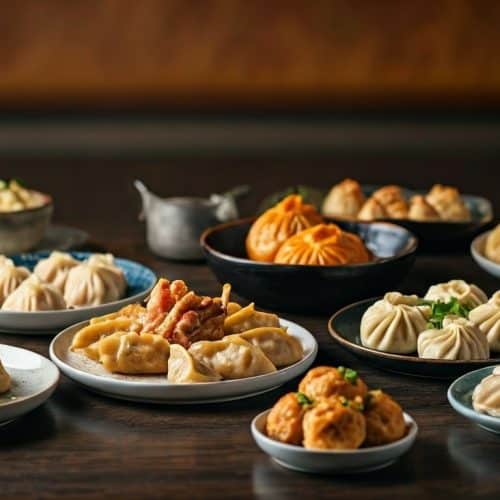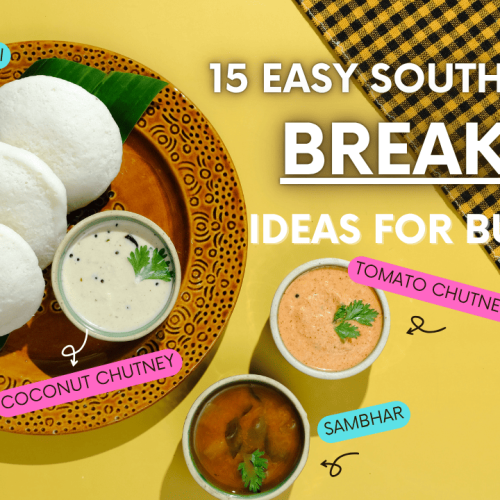Key Highlights
- Prevent spoilage by storing dry ingredients, spices, and cooked food in airtight containers and refrigerating them wisely.
- Handle fruits, vegetables, and dairy safely by washing, drying, and storing produce properly, boiling milk, and reheating leftovers.
- Practice smart grocery habits by buying smaller quantities and choosing seasonal foods to stay fresh.
- Maintain kitchen hygiene by cleaning shelves, ventilating, and controlling pests to reduce contamination.
- Boost immunity naturally by using turmeric, lemon, and vinegar, and including herbal teas, warm meals, and immunity-boosting foods daily.
The rainy season brings cool relief after the summer, but it also makes monsoon season food spoil faster due to humidity and damp conditions during the breeding season, potentially leading to digestive issues.
High humidity also encourages bacteria and fungi, making food safety a major concern. Without proper storage, even seasonal fruits and fresh produce can quickly become unsafe to eat. However, a few simple precautions can help you handle food in the monsoon more safely and effectively.
In this blog, we’ll explore 12 effective monsoon food safety tips that help you enjoy safe, hygienic, and nutritious meals while keeping your kitchen healthy throughout the monsoon season.
Want Fresh and Safe Food This Monsoon? Follow These 12 Tips!
The secret to a healthy kitchen during the monsoon season lies in prevention; keeping moisture out, storing food correctly, and maintaining daily hygiene. Here are 12 simple and effective monsoon food tips that can help you protect your food, improve its quality, and make your rainy-season meals safer and tastier:
1. Keep Dry Ingredients Moisture-Free
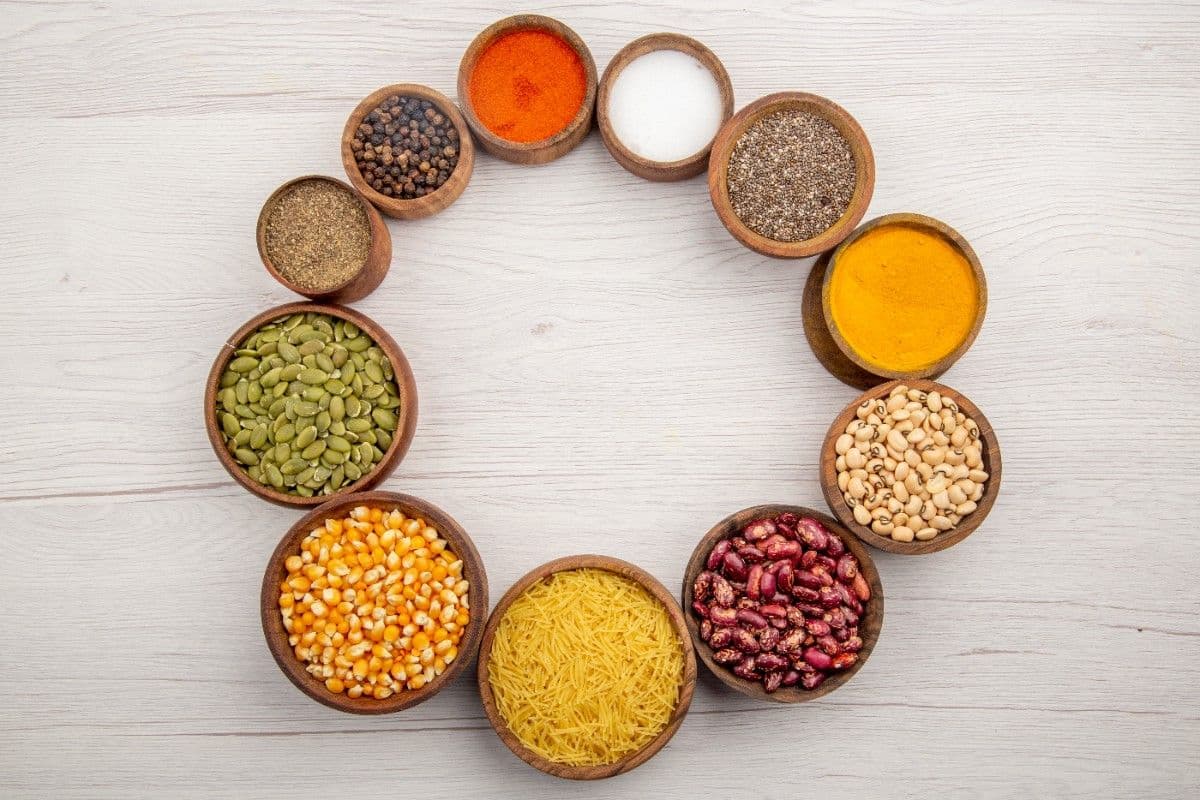
Dry Ingredients on a table
Humidity can damage dry items like rice, flour, and lentils within days. Always store them in airtight containers, away from stoves and sinks. Lightly roasting grains before storage helps remove residual moisture naturally while preserving most of their nutrients.
You can also add dried neem leaves, cloves, or even bay leaves to jars as natural insect repellents and mild dehumidifiers. Avoid using wet spoons and plastic bags, which can trap moisture and promote spoilage.
Following these monsoon food storage tips ensures that your dry ingredients stay fresh, aromatic, and pest-free, perfect for preparing comforting meals to enjoy with a warm cup of masala chai.. These practices also help extend shelf life of food during the humid months.
2. Drink Safe and Filtered Water
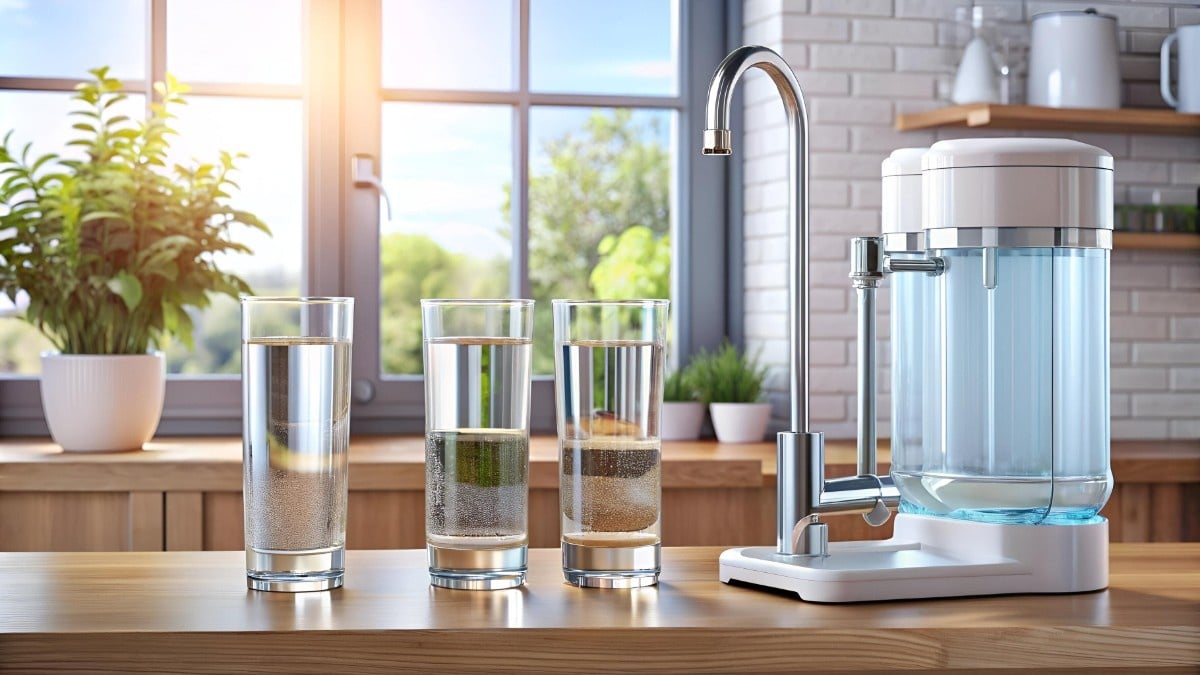
Safe and Filtered Water
During the rainy season, waterborne diseases increase due to contamination from rainwater, overflowing drains, and puddles. Drinking untreated water can cause infections and digestive issues. Always use filtered, boiled, or bottled water for drinking and cooking. Avoid consuming water from taps, open containers, or untreated sources, especially after heavy rainfall.
Maintaining safe hydration is an essential part of monsoon food safety tips and helps protect your family from illnesses. Incorporating this simple precaution along with clean cooking habits ensures that both meals and beverages are safe for consumption throughout the humid season.
3. Refrigerate Food Smartly
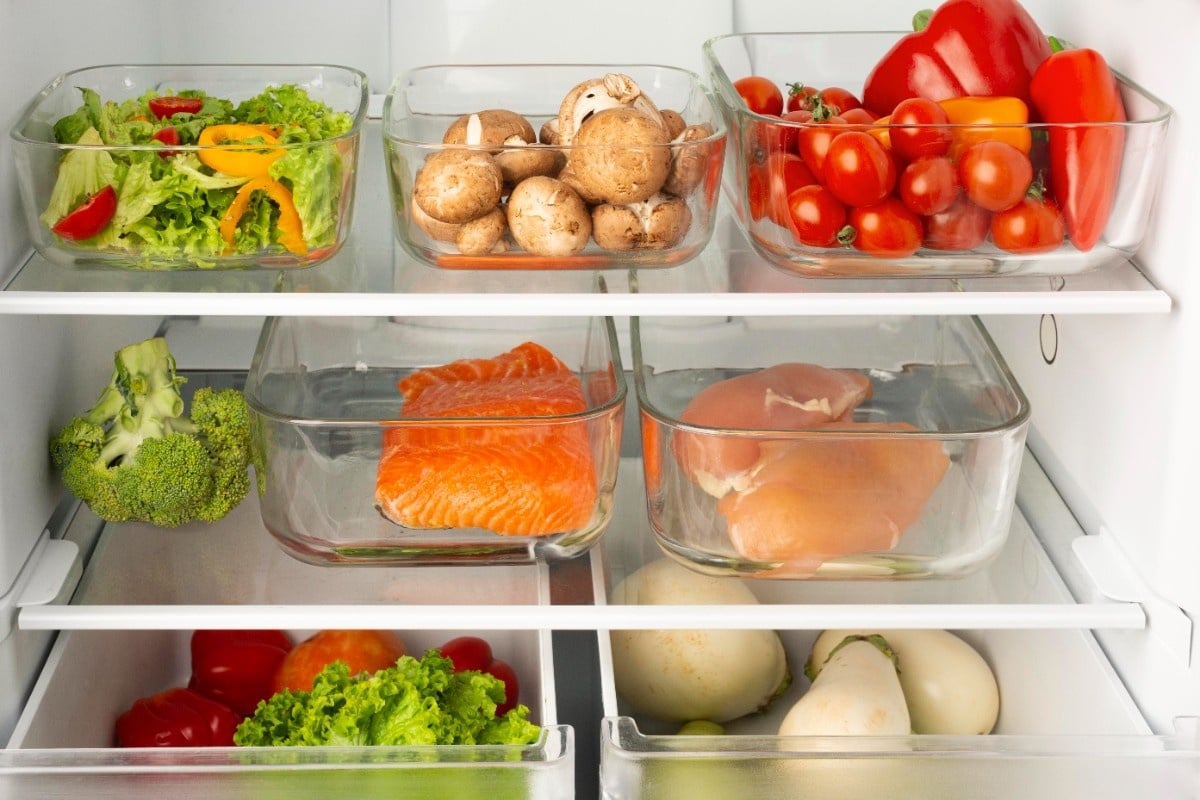
Refrigerated Food
Refrigeration requires extra care during the monsoon season. Avoid overloading your fridge, as proper airflow helps maintain freshness and prevents unpleasant odours.
Store cooked dishes in tightly sealed containers to reduce the risk of contamination. Always let hot food cool to room temperature before refrigerating to prevent condensation.
Line the vegetable drawer with paper towels to absorb excess moisture and delay spoilage. Regularly clean shelves and discard expired items to maintain hygiene.
Before eating, reheat leftovers thoroughly to ensure safety and enjoy meals that remain fresh, flavourful, and healthy even in humid weather.
4. Wash and Store Fruits and Vegetables Correctly
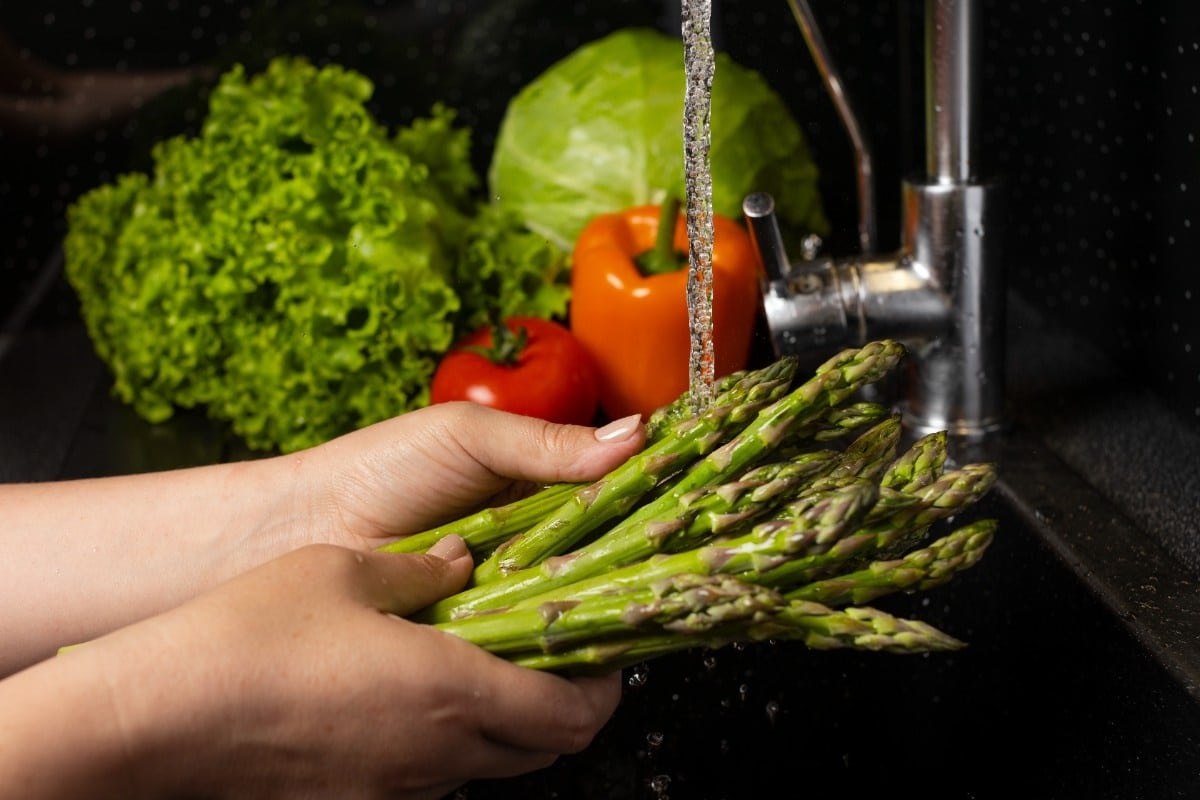
A Woman Washing Vegetables
Fruits and vegetables are most vulnerable to humidity during the monsoon season. Wash them in clean water mixed with salt or vinegar to remove dirt, wax, and germs, then dry them thoroughly before refrigeration.
Wrap leafy greens in paper towels and store them in mesh or breathable bags to prevent excess moisture and wilting. Choose seasonal fruits like apples, pears, and pomegranates; they’re lighter on digestion and help strengthen the immune system, keeping you healthy, energetic, and refreshed throughout the damp monsoon weather.
5. Keep Spices and Condiments Dry
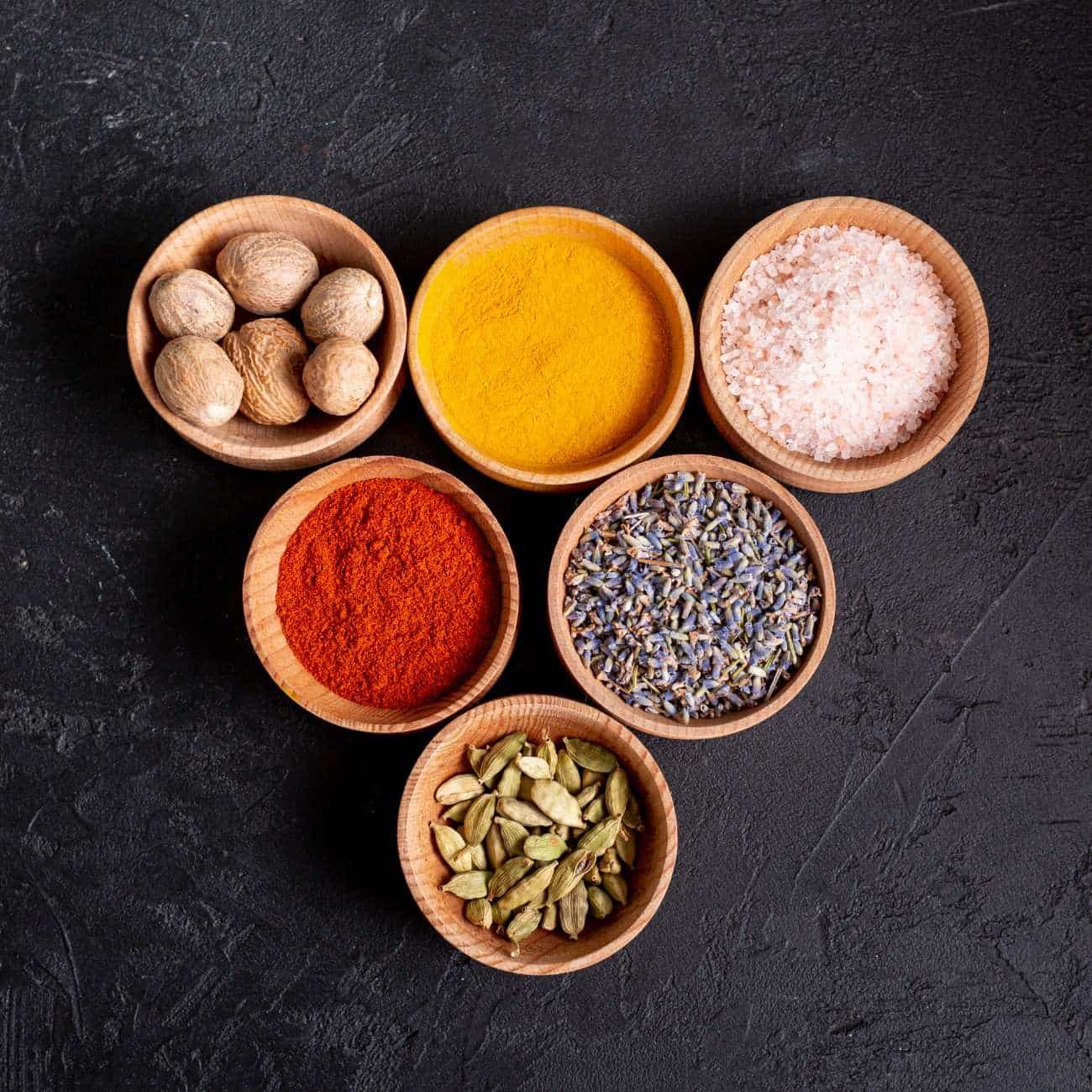
Spices and Condiments on the kitchen counter
Spices quickly lose flavour and aroma in damp monsoon weather. Store them in airtight jars, away from steam, heat, and direct sunlight. Adding a few grains of rice to spice jars helps absorb extra moisture naturally, keeping them dry and fresh.
Sun-dry whole spices like chilli, cumin, and coriander once every few weeks to preserve their potency and fragrance. These simple steps not only maintain the taste and aroma of your spices but also help improve food packaging and shelf life, ensuring your spice collection remains aromatic, vibrant, and ready to enhance every monsoon meal.
6. Handle Dairy and Cooked Food Carefully

Dairy Food
Dairy items and cooked meals spoil faster in humid monsoon weather, increasing the risk of stomach infections and food poisoning. Always boil milk before refrigerating and consume it within two days to ensure safety. Store curd and paneer in airtight containers, which prevents odours and helps maintain healthy gut flora.
Leftovers should be stored promptly in sealed containers and reheated thoroughly before serving. Following these precautions keeps your meals safe, fresh, and wholesome, protecting your family throughout the damp season.
7. Cook Food Well
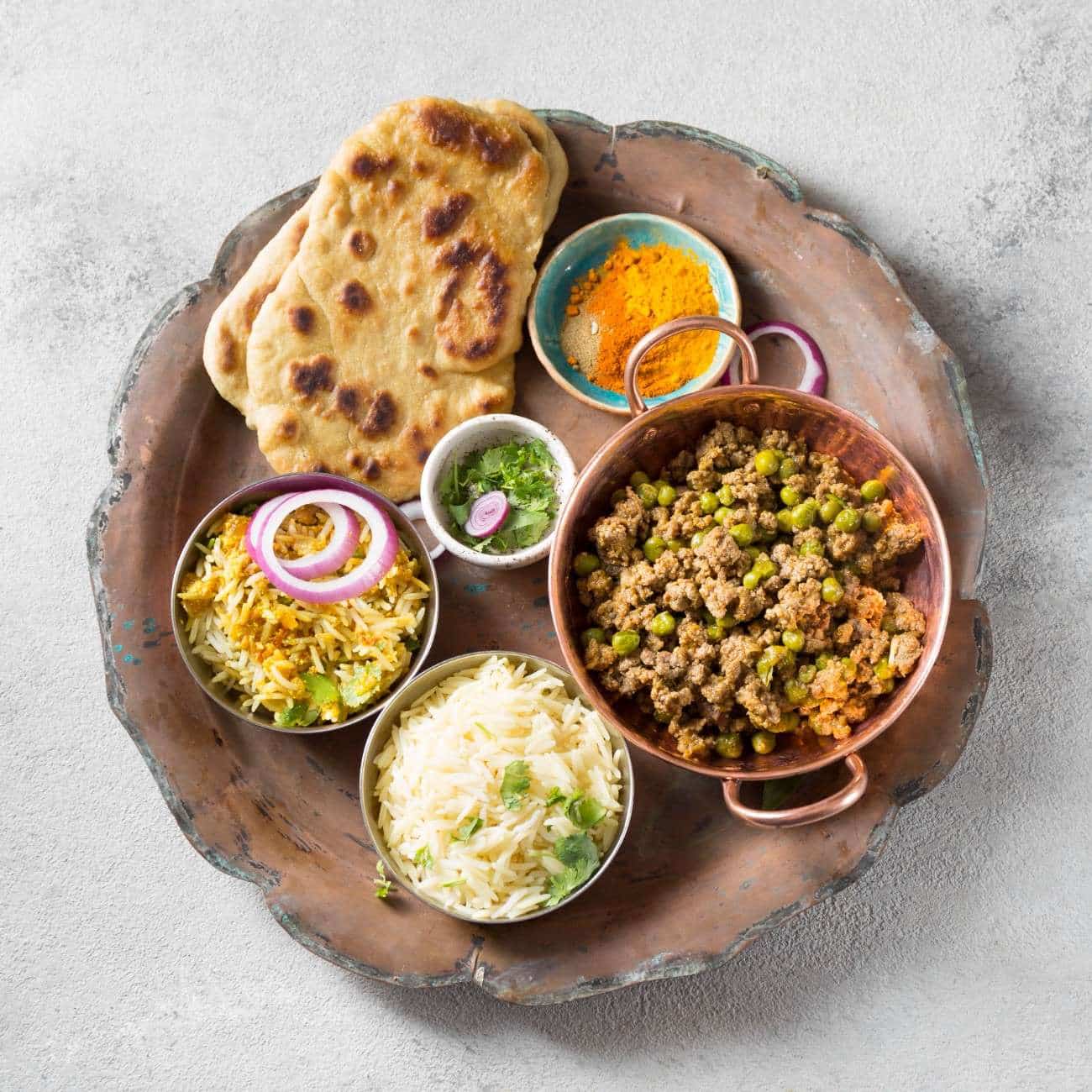
Cooked Food
Undercooked food can harbour harmful bacteria that multiply rapidly in damp conditions. Always ensure that meals, especially rice, pulses, and vegetables, are thoroughly cooked. Proper cooking not only kills pathogens but also makes digestion easier and preserves nutrients. Well-cooked food supports a healthy immune system, which is especially important during the monsoon.
Including spices like garlic, turmeric, and ginger adds natural antibacterial benefits while enhancing flavour. Cooking food well is a fundamental safety tip in the monsoon that helps maintain safe and nutritious meals while minimising the risk of contamination.
8. Maintain Kitchen Hygiene

A woman cleaning her kitchen
A clean kitchen is key to safe food, especially during the rainy season. Wipe shelves daily with mild disinfectants, keep bins covered, and ventilate your kitchen to prevent dampness and bacterial growth.
Regularly inspect for mould, insects, or pests, particularly around drains, sinks, and corners. Conduct pest control measures before or early in the rainy season to prevent infestations. Maintaining proper hygiene is one of the most important monsoon food safety tips for your home, ensuring that your family enjoys fresh, safe, and healthy meals throughout the damp and humid weather.
9. Use Natural Preservatives
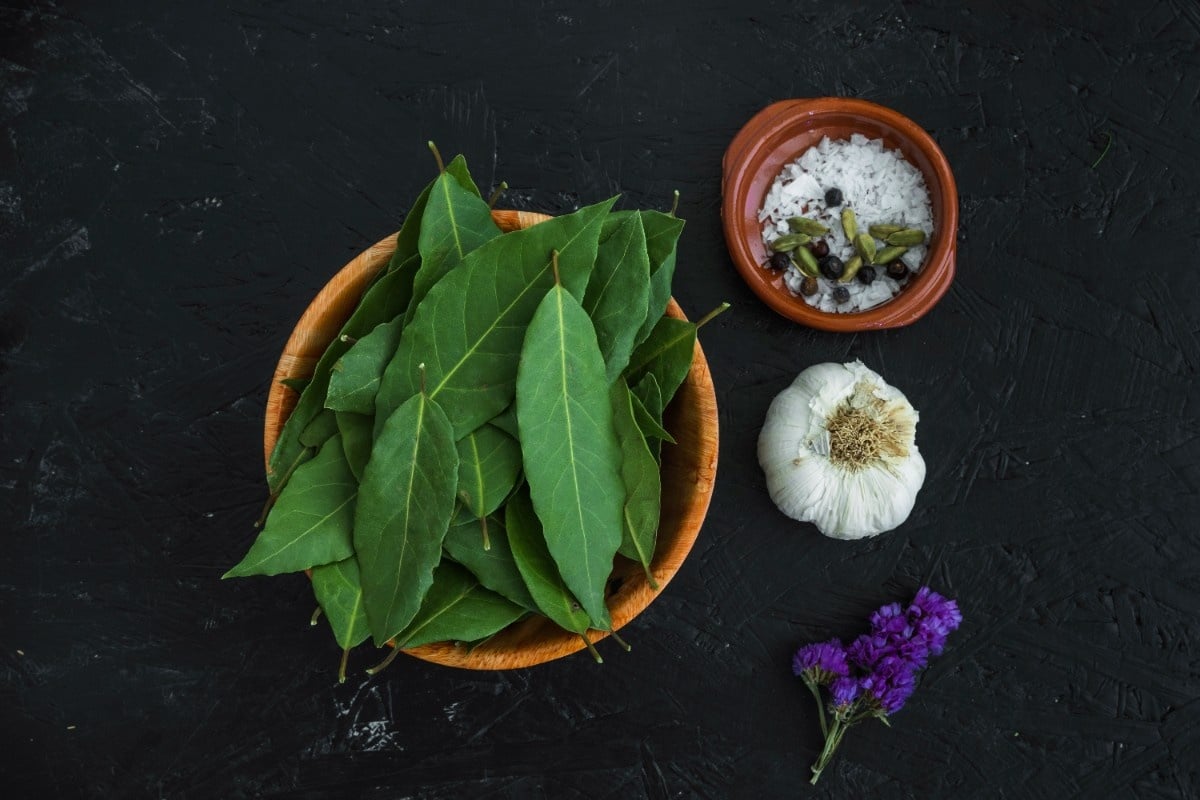
Natural Preservatives
Natural preservatives like turmeric, lemon, vinegar, and salt not only enhance flavour but also help keep food safe for longer during the monsoon. Add turmeric to curries and pickles, soak vegetables in vinegar water, or store items in brine to prevent spoilage and maintain freshness.
Drinking warm herbal tea, such as tulsi or ginger, supports digestion and strengthens the immune system during humid days. These simple, natural practices not only preserve your meals but also contribute to overall wellness, making your monsoon diet safer, healthier, and more aromatic.
10. Check for Foul Odors and Texture Changes
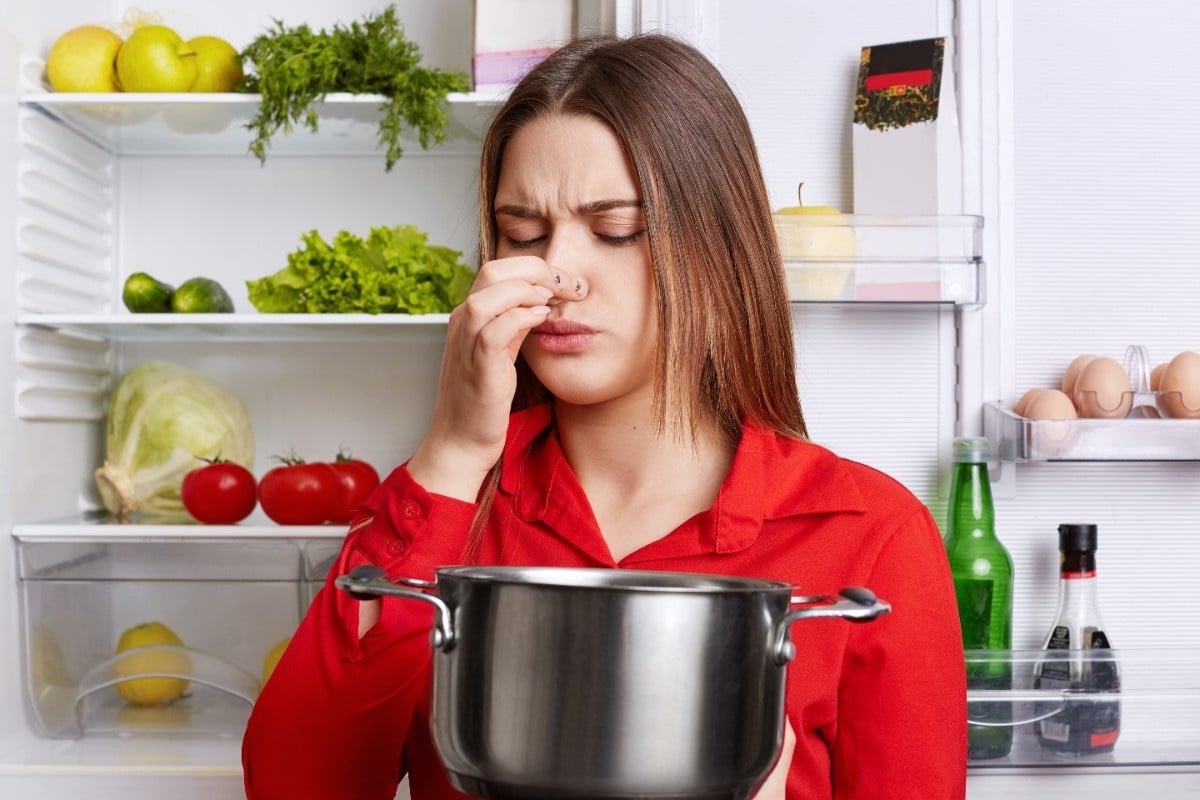
Foul Odour from Food
Always inspect food before consumption for signs of spoilage such as unusual odors, discoloration, or slimy texture. Moist conditions in the monsoon accelerate bacterial and fungal growth, making it easy for food to become unsafe. Discard anything suspicious immediately to avoid stomach infections.
Checking food regularly ensures freshness, prevents contamination, and helps maintain safe meals. By monitoring ingredients for changes, you also support proper food packaging and shelf life while enjoying hygienic and nutritious dishes throughout the rainy season.
11. Avoid Pre-Cut and Pre-Cooked Street Food After Rain
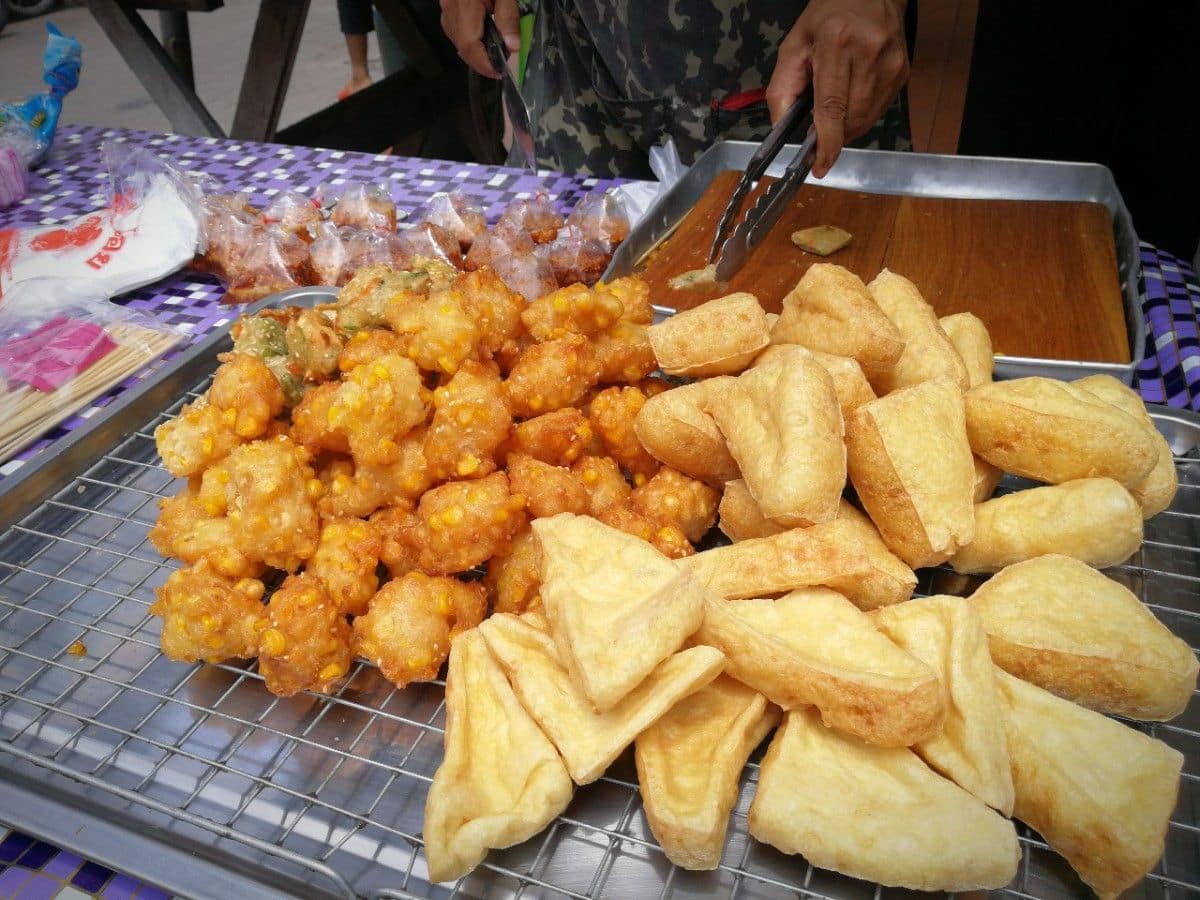
Pre Cooked Street Food
Street food can be risky during the monsoon due to contamination from moisture, unhygienic handling, and reused oil. Avoid pre-cut fruits, packaged snacks, or fried foods sold outside after rainfall. Opt for freshly cooked home-prepared meals to minimize the risk of stomach infections and foodborne diseases.
This ensures that you and your family consume safe, nutritious, and hygienic meals. Choosing home-cooked food over street food also supports better digestion and immunity, making your monsoon diet healthier and safer for everyone.
12. Practice Safe Cooking Oil Handling
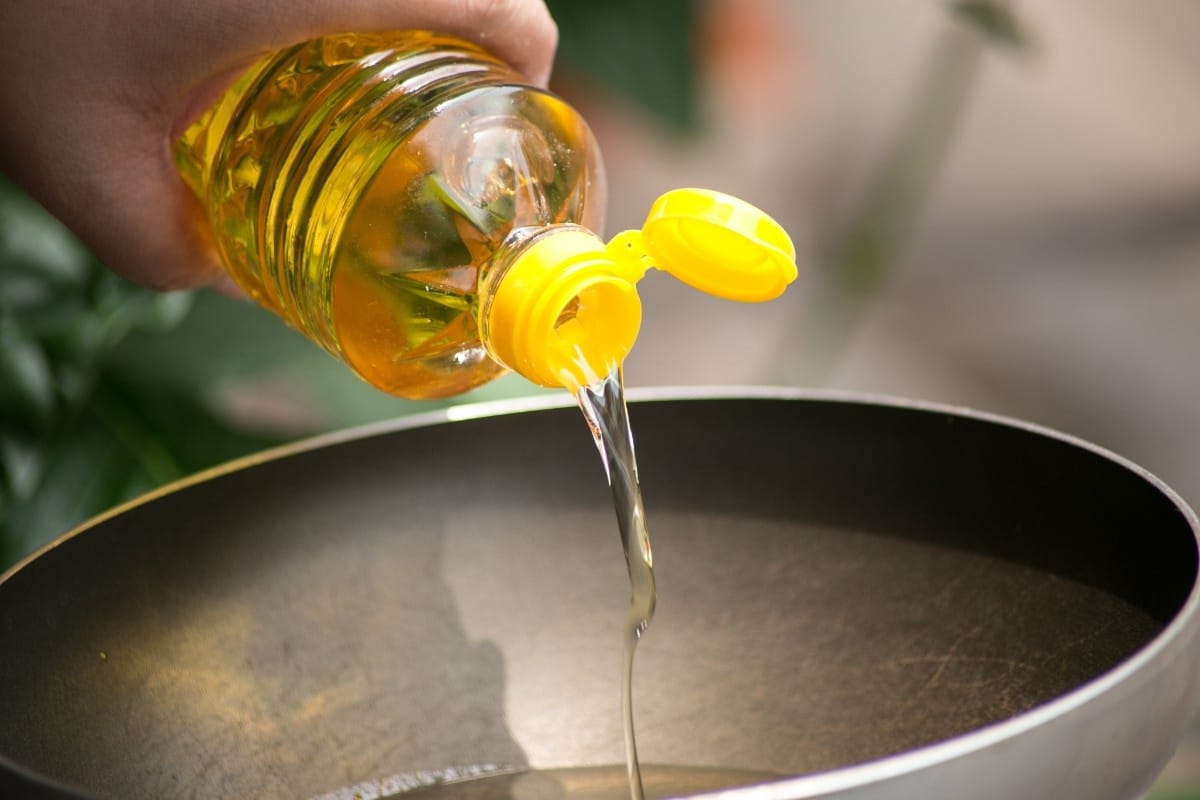
A woman pouring cooking oil
Used cooking oil can spoil quickly in humid monsoon conditions, leading to rancidity and bacterial growth. Avoid reusing oil multiple times, and store unused oil in airtight containers away from heat and sunlight. Filter oil after frying to remove food particles and prevent contamination. Using fresh oil for cooking not only enhances flavour but also prevents health issues such as stomach infections.
Following this precaution is one of the most important in the monsoon. Proper oil handling supports safe food in monsoon, ensures hygienic meals, and maintains both nutrition and taste in every dish.
Conclusion
The monsoon season brings high humidity and damp conditions that can quickly spoil food, promote bacterial and fungal growth, and increase the risk of stomach infections and foodborne illnesses. Without proper precautions, even fresh produce, dairy, and cooked meals can become unsafe to eat, causing digestive issues and health problems for your family.
Include seasonal fruits, bitter gourd, herbal teas, and probiotics to boost your immune system and overall health naturally. Always wash fruits, avoid street food, choose warm dishes, and focus on freshness to make this rainy season both safe and satisfying.
Frequently Asked Questions
What are the best foods to eat during the monsoon season to stay healthy?
During the rainy season, choose light, freshly cooked meals made with bottle gourd, bitter gourd, corn, and moong dal to beat the heat of summer. Add herbal teas and spices like turmeric and garlic to strengthen your immune response and prevent infections common in the monsoon season.
What are some safe snacks to enjoy in the monsoon?
Try roasted makhana, steamed corn, vegetable upma, or moong dal chilla. These are light and nutritious. Homemade snacks prepared with minimal oil are the safest choice for the monsoon season.
Are there any specific fruits or vegetables recommended in the rainy season?
Yes, choose seasonal fruits such as apples, pears, and pomegranates that have lower water content. Vegetables like bottle gourd, ridge gourd, and bitter gourd, which are considered watery foods, are excellent for detoxifying the body and improving digestion, contributing to gut health.
What are some essential diet tips for staying healthy in the monsoon?
Eat freshly prepared food, drink boiled warm water, and avoid street food to maintain good health. Include ginger, turmeric, and tulsi in your diet. Warm herbal teas help maintain your immune system during the rainy season.
Are pakoras bad for health in the monsoon?
Not if eaten occasionally and prepared hygienically. Avoid buying them from street food stalls, as reused oil can cause stomach infections. Homemade pakoras made with minimal oil are safer.
Is it safe to drink milk in the rainy season?
Yes, but make sure it’s boiled and stored properly. Add a pinch of turmeric or ginger for added immunity and better digestion during the monsoon season.
What would be the healthy eating tips in the monsoon?
During the monsoon, eat freshly cooked meals and thoroughly washed fruits and vegetables. Avoid street food and uncovered snacks, prefer warm soups or steamed dishes, and use proper storage to extend the shelf life of food.
Which traditional foods or treats are popular during monsoon festivals?
During monsoon festivals, popular traditional foods include pakoras, samosas, bhajiyas, spicy chai, steamed idlis, jalebis, and hot soups. Seasonal fruits, coconut-based sweets, and roasted corn are also enjoyed, complementing the cozy rainy atmosphere.
Can you share some simple and comforting monsoon recipes?
Some simple and comforting monsoon recipes include hot moong dal soup, vegetable khichdi, masala chai with pakoras, steamed idlis with sambar, and ginger-tulsi kadha. These warm, light dishes boost immunity and make rainy days cozy and satisfying.

